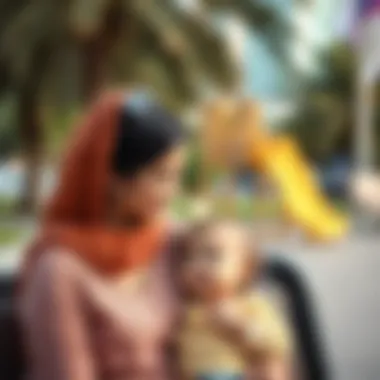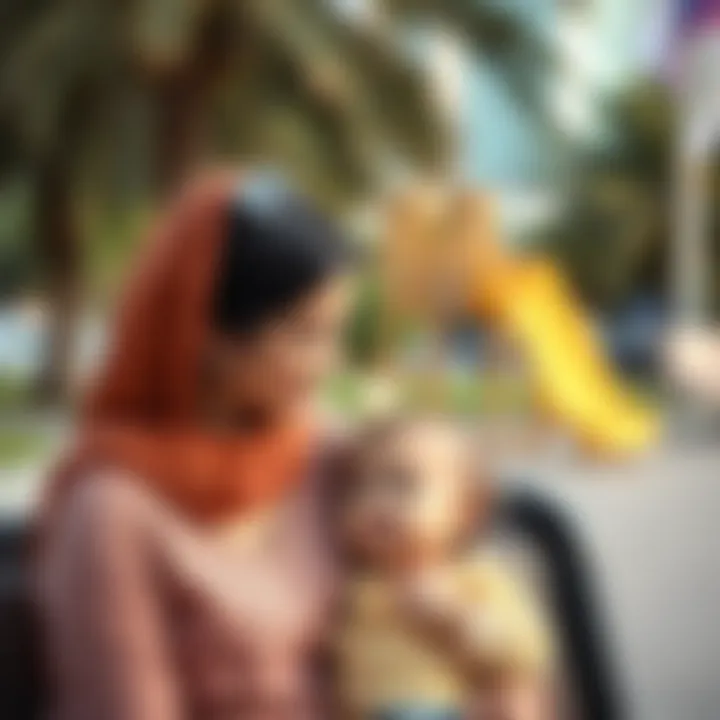Mother Sponsoring Child in Dubai: A Complete 2023 Guide


Intro
Navigating the waters of sponsorship in a city like Dubai can be likened to finding your way through a bustling marketplace—the sights, sounds, and regulations can be overwhelming. For mothers looking to sponsor their children, the process is layered with legalities, emotional nuances, and financial implications. With the expatriate community booming, understanding the ins and outs of child sponsorship becomes pivotal.
In 2023, the landscape continues to evolve, reflecting the changing demographics and needs of families. This piece aims to demystify the sponsorship process for mothers in Dubai, offering insights into the practical steps required, the essential documents you'll need, and key considerations regarding family dynamics and well-being in this vibrant metropolis. With a wealth of information packed in, whether you’re a new arrival or have been living in Dubai for a while, this guide acts as your compass, helping you chart the course ahead.
Understanding Child Sponsorship in Dubai
When considering the intricate tapestry of life in Dubai, the concept of child sponsorship unfolds as a significant element for expatriate families. For mothers, understanding this aspect is essential, not merely as a legal requirement but as a cornerstone of familial stability and growth in a new environment. In this section, we explore the nuances of child sponsorship, the obligations that accompany it, and the potential benefits it brings to both parents and children in this bustling metropolis.
Definition and Concept
Child sponsorship in Dubai refers to the legal procedure whereby a mother assumes the financial responsibility and guardianship for her child while residing in the United Arab Emirates. This arrangement primarily applies to expatriates who wish to ensure a stable upbringing for their children while navigating the unique socio-economic landscape of Dubai. There are formal processes sanctioned by UAE law that outline how sponsorship can be established, especially for mothers who may not hold a residency visa.
This statute is not just about having rights; it also embodies the commitment to provide emotional, educational, and social support. The idea of sponsoring a child stretches beyond mere paperwork; it becomes a pledge to nurture and guide a young life in a culturally vibrant yet legally complex environment. Many mothers find that establishing this bond creates a sense of belonging, fostering a nurturing atmosphere for both parent and child during their time in Dubai.
Importance of Sponsorship
Sponsoring a child in Dubai is imbued with significance for numerous reasons, which extend far beyond fulfilling legal obligations.
- Legal Security: This sponsorship ensures that the child is legally recognized within the UAE, safeguarding both rights and welfare.
- Access to Facilities: Sponsored children can gain access to educational institutions, healthcare services, and other vital amenities, laying a foundation for a bright future.
- Cultural Integration: For expatriate families, sponsorship enables children to firmly root themselves in the local culture while also respecting the diverse background they come from. It fosters an environment where they can adapt and thrive.
Furthermore, mothers play a pivotal role in shaping their child’s experience in Dubai. From navigating the school selection process to ensuring compliance with local regulations, the insights gained from sponsoring a child can lead to enriched life experiences not only for the child but also for the mother herself. This journey of cooperation between a mother and her child is laden with opportunities for growth, both personally and socially.
As you delve deeper into the subsequent sections, we will unravel the legal framework, eligibility criteria, and the documentation required, mapping out an essential guide for those considering this vital path of child sponsorship in Dubai.
Legal Framework for Sponsoring a Child
Understanding the legal framework for sponsoring a child in Dubai is crucial for any mother considering this path. Navigating the laws and regulations can seem daunting, yet it serves as the backbone of a successful sponsorship process. Without a solid understanding of the legalities, potential pitfalls may arise, which can complicate an otherwise straightforward process. This section aims to clarify the legal dimensions involved, enabling mothers to proceed with confidence.
Overview of UAE Family Sponsorship Laws
The UAE has established a framework that governs family sponsorship, designed to cater primarily to expatriates. Essentially, it allows individuals to bring their dependents into the country legally, contingent upon meeting specific criteria.
Laws such as Federal Law No. 38 of 2020 serve as guiding principles for family sponsorship. This law emphasizes the rights of both the sponsor—the mother in this case—and the sponsored child, outlining the necessary requirements that must be fulfilled.
Key Points:
- Eligibility: Mothers must possess a valid residency visa, demonstrating their ability to support their children.
- Sponsorship Duration: The visa can be temporary or long-term, depending on various factors.
- Conditions on Employment: The laws stipulate that the mother must meet employment or income criteria, ensuring financial stability for the family.
The authorities frequently review laws to adapt to changing societal norms and requirements, making it essential for mothers to stay informed about recent updates. Compliance with these laws serves as not just a legal requirement but also a means to secure the well-being of the child in their new environment.
Mother's Rights and Responsibilities
Sponsoring a child is not solely a matter of eligibility; it also entails a series of rights and responsibilities for the mother.
- Rights: Sponsored mothers enjoy several rights, including the right to renew sponsorship visas, the right to apply for educational or healthcare services for their children, and the right to reside with their children without fear of arbitrary removal from the country. The clarity and assurance these rights provide cannot be overstated, as they allow mothers to focus on their children’s well-being.
- Responsibilities: However, with rights come responsibilities. Mothers must ensure that all necessary documentation is filed accurately and timely. They must also comply with the local laws regarding residency, and maintain the child's well-being, which includes ensuring access to education and healthcare. Regular communication with local authorities is advisable, as it can help clarify any doubts or questions that may arise during the process.
In essence, understanding these rights and responsibilities not only aids in a smoother process but also contributes to a healthier family dynamic once the sponsorship is secured. It transforms what might initially seem an arduous task into an empowering journey of securing a better future for the child.
Navigating the legal landscape can feel overwhelming, yet knowledge equips mothers to undertake this journey with resilience and purpose.
The legal framework surrounding child sponsorship in Dubai lays the groundwork for a supportive environment where expatriate families can thrive. By grasping both the laws and personal obligations, mothers can effectively champion opportunities for their children in this dynamic locale.
Eligibility Criteria for Sponsorship
Understanding the eligibility criteria for mothers sponsoring their children in Dubai is crucial. This section clarifies the specific requirements, benefits, and considerations surrounding this significant responsibility. Navigating the landscape of child sponsorship can be a daunting experience, laden with legal and personal implications. Hence, mothers must grasp these eligibility criteria fully to ensure that they meet all necessary requirements for a successful application.
Requirements for Mothers
Mothers looking to sponsor their children in Dubai must fulfill certain fundamental criteria. Here are the primary conditions:
- Residency Status: The mother should possess a valid residency visa, which is categorized under employment or dependent status. Without this, sponsorship is not possible.
- Income Requirements: Another significant factor is the financial capability to support the child. Typically, mothers are expected to have a minimum salary, which is often specified by local authorities. This income criterion ensures that the sponsorship is viable under Dubai’s economic structure.
- Housing: Proof of appropriate housing suitable for the child is also necessitated. This showing often includes documentation proving that living conditions comply with local standards, such as lease agreements or ownership certificates.
- Age and Legal Custody: The mother must provide documentation proving maternal custody, especially in cases involving divorce. Custody agreements or court orders might be required to affirm that she has the legal authority to sponsor her child.
Further than these basic requirements, mothers are encouraged to maintain documentation outlining their emotional and legal readiness to take charge of their child's welfare. This might include educational plans or health coverage specifics. The responsibility inherently lies within the mother's ability to provide a nurturing environment.
Child's Age and Other Factors
When it comes to the child’s age and other pertinent factors, they play a pivotal role in the sponsorship process. Here are some important elements to consider:


- Age Limitations: Children under the age of 18 are generally eligible for sponsorship. However, varying rules may apply to older minors, especially those at or over this threshold, particularly students or dependents.
- Educational Considerations: If the child is pursuing education in Dubai, the mother's sponsorship must align with their schooling age and program. Various educational institutions might have specific requirements for accepting sponsored students, impacting the overall application.
- Health Considerations: Health records may be required to ensure that the child does not present significant health risks. To foster a healthy upbringing, local authorities might ask for evidence of vaccinations or other health clearances.
- Proof of Relationship: Documenting the mother-child relationship is paramount. Birth certificates and legal papers that establish parental ties will be examined carefully.
In summary, understanding the eligibility criteria for sponsoring a child in Dubai involves appreciating the mosaic of familial, legal, and financial dynamics at play. The requirements laid out by the UAE authorities are not just bureaucratic checkpoints, but rather they reflect a structured approach to ensuring the welfare of children within its borders. By comprehensively addressing these criteria, mothers can navigate the process more effectively and secure a stable future for their children in Dubai.
It is essential for mothers to be thorough in their preparation, ensuring all documents are in order and questions—both personal and procedural—are addressed head-on. This diligence pays off when sponsoring a child in a vibrant yet complex city like Dubai.
Necessary Documentation for Sponsoring a Child
When delving into the intricacies of sponsoring a child in Dubai, understanding the necessary documentation becomes paramount. Having the correct paperwork can make or break the entire process. Not only does it ensure compliance with local laws, but it also facilitates smoother interactions with authorities. Proper documentation serves as proof of eligibility and intention, thus establishing a legal basis for the mom's sponsorship claim. Here's how to navigate this critical aspect effectively.
Key Documents Required
To embark on the sponsorship journey, several essential documents need to be prepared. The following list outlines the key paperwork typically required:
- Mother’s Passport Copy: A clear copy ensures that identity verification sticks.
- Residence Visa Copy: This proves that the mother is legally residing in Dubai.
- Birth Certificate of the Child: It should be officially attested, showcasing the relationship between mother and child.
- Marriage Certificate (if applicable): For single mothers, this might not be necessary, but for wed couples, it’s a vital piece.
- Health Insurance Document: Ensuring the child’s welfare is often tracked through insurance.
- NOC from Relevant Authorities: Sometimes, a No Objection Certificate is needed depending on the child's nationality and the mother's residency status.
These documents lay the groundwork for successfully initiating the sponsorship process. Missing any of them could lead to delays, so it’s advisable to gather them early on in the process.
Application Forms and Procedures
Once all key documents are in order, the next step involves filling out application forms accurately. There are specific forms designed for the sponsorship of children. To access these forms, mothers can visit the relevant government websites or local authority offices. Once obtained, the procedure generally involves a few key steps:
- Complete the Application Form: Be sure that all information is precise. Minor mistakes could lead to major headaches later on.
- Attach Required Documents: Ensure that all the needed paperwork accompanies the application. Double-check everything to avoid unnecessary bumps.
- Submit in-person or Online: Depending on the chosen method, submit the application either in person at a local authority office or online through their portal.
- Pay the Relevant Fees: There might be fees associated with the processing of the sponsorship application.
- Wait for Processing: After submission, patience is key. Processing times can vary.
The initial stages of documentation and application are critical in ensuring a straightforward sponsorship process.
Selecting the right path for submitting the application can greatly influence the overall experience. Familiarity with local processes can also aid resolve potential complications down the line.
By understanding the importance of documentation and following a clear application procedure, mothers can significantly increase their chances of a successful sponsorship process in Dubai.
Application Process for Sponsorship
Navigating the application process for sponsoring a child in Dubai entails a comprehensive understanding of the requirements and needed steps. This process is crucial not only for compliance with local laws but also to ensure that the welfare of the child is safeguarded throughout.
Step-by-Step Guide
To initiate the sponsorship application, mothers must follow a clearly delineated series of steps, ensuring they don't miss any critical details. Here’s a concise yet thorough breakdown of the process:
- Gather Documentation: The first order of business is to collect the necessary documents that prove your identity and relationship with your child. Relevant documents usually include:
- Initial Application Submission: After compiling the documents, you’ll need to submit your application through the appropriate government channel, typically through the General Directorate of Residency and Foreigners Affairs (GDRFA) in Dubai. Depending on your situation, applications can sometimes be submitted online, which adds a layer of convenience.
- Wait for Approval: Once submitted, all documents undergo a verification process. It can feel like waiting for paint to dry, but it’s essential to allow the authorities time to assess your application thoroughly.
- Follow-Up: Occasionally, authorities may request additional information or documents. Being prompt in your responses can help move the process along efficiently.
- Receive Sponsorship Approval: After thorough checks, if everything aligns, you will receive the sponsorship approval. This letter is crucial for ongoing legal compliance.
- Final Steps and Issuance of Residency: The last step involves finalizing the residency visa process for the child, ensuring they have the same rights and access as residents.
- Passport copies (mother and child)
- Birth certificate of the child
- Proof of residency in Dubai
- Employment letter, indicating stable income and job position
- A recent photograph of the child and the mother (usually in specific sizes)
"A clear path is often paved by thorough preparation and understanding the steps necessary. Once you ace the application process, you’re not just following the law, but ensuring a stable future for your child."
Processing Time and Costs
Understanding the timeline and financial stakes is as crucial as the application steps themselves. For many, time is of the essence, and knowing how long to expect can alleviate a lot of stress.
- Processing Time: The entire process typically takes approximately 2 to 4 weeks. However, several factors can influence this timeframe:
- Cost Involved: The financial aspect isn't insignificant. You can expect costs to include:
- Complexity of the case
- Incomplete documentation
- Current workload of the processing agencies
- Application fees, which may vary based on the type and duration of the sponsorship
- Medical evaluation fees, primarily if the child is of an age where health checks are mandatory
- Residency visa fees, which are recurrent
- Possible additional consultancy or agency fees, should you opt for assistance in the process
It is wise to budget accordingly and keep a buffer for unexpected expenses. This strategic foresight will help you navigate the process without financial hiccups.
Potential Challenges in Sponsorship
In the context of sponsoring a child in Dubai, various challenges may arise that could complicate the process for mothers. Understanding these potential obstacles is crucial, as it not only prepares mothers for the journey ahead but also helps them navigate a system that may seem daunting at first. From navigating legal complexities to dealing with emotional aspects of the sponsorship, being aware of these challenges can aid in smoother transitions.
Common Issues Faced
Sponsoring a child isn’t as straightforward as one might imagine. Several common issues can surface:
- Documentation Gaps
Many mothers find that they lack specific documents required for the sponsorship process, which can delay applications or cause rejections. - Miscommunication With Authorities
It's often difficult to get clear answers from local authorities. Language barriers and differing expectations can lead to misunderstandings. - Unexpected Costs
Sponsorship isn’t just about fulfilling requirements; it can involve unexpected expenses like legal fees or additional documentation costs that weren't initially anticipated. - Cultural Transition for the Child
The child may face challenges adapting to the new environment, which can lead to emotional struggles that complicate the sponsorship process.
Addressing these common issues early on can help alleviate stress and foster a better understanding of the situation at hand.
Legal Hurdles and Solutions
Legal hurdles are perhaps the most daunting aspect of child sponsorship in Dubai. Various laws and regulations can trip up even the most prepared individuals.


- Bureaucratic Delays
Applications can be held up in bureaucratic procedures, causing anxiety and frustration. It’s essential to be patient and proactive in following up with local offices on the status of your application. - Changing Regulations
The legal landscape in Dubai is ever-evolving. For instance, regulations on expatriate sponsorships can shift, impacting eligibility and requirements over time. Staying informed about recent changes, particularly those in 2023, through resources like government portals can be a lifesaver. - Disputes Over Custody or Rights
Should there be any previous disputes over custody, these can impede the process significantly. Consulting with family law professionals who are knowledgeable about UAE laws can provide valuable insights.
It’s wise to create a checklist of legal requirements specific to your situation, mitigating potential missteps before they become significant issues.
Navigating legal hurdles requires careful planning, attention to detail, and sometimes the help of professionals. A well-prepared mother is in the best position to tackle any legal challenges head-on, ensuring that her child is sponsored successfully and lives comfortably in their new environment.
Role of Local Authorities
Navigating the intricacies of child sponsorship in Dubai can feel like trekking through a maze with a blindfold. Here, the role of local authorities becomes paramount. They are not merely gatekeepers; they are facilitators that help mothers through the process, ensuring compliance with UAE laws and guidelines. Getting a grip on how these agencies operate can save time, reduce stress, and pave the way for a successful sponsorship journey.
Government Agencies Involved in Sponsorship
In Dubai, several government bodies play crucial roles in child sponsorship applications:
- General Directorate of Residency and Foreigners Affairs: This agency is often at the forefront of processing residency visas and offers guidance on sponsorship procedures. Being well-versed with their requirements can make or break your application.
- Ministry of Community Development: They work on family welfare issues and can provide support services that are vital during the sponsorship process.
- Dubai Health Authority: Ensuring that the child receives appropriate healthcare is part of the sponsorship. The Health Authority can also assist with health insurance requirements that may be necessary for the sponsorship.
Engaging proactively with these agencies not only ensures that you meet all legal requirements but also allows you to ask questions and seek clarifications about the process.
Regulatory Changes in
This year has seen significant regulatory updates regarding child sponsorship in Dubai. Staying informed about these changes is essential for any mother contemplating sponsorship.
Some key updates include:
- Streamlined Application Procedures: The government has made strides toward simplifying the application process. This move is designed to make it more user-friendly, particularly for those who may not be familiar with bureaucratic red tape.
- Financial Threshold Adjustments: The minimum income requirements for sponsorship have been revised. Understanding these new thresholds is critical for ensuring you’re on the right side of the requirements.
- Expanded Benefits for Expatriate Families: There are new provisions aimed at enhancing support for expatriate families, helping ease the integration into Dubai's educational and social fabric.
"Understanding these regulatory changes is not just about legal compliance; it's about ensuring a smoother transitional experience for both the mother and child in a new environment."
Legal landscapes can shift, and this year's adjustments reflect a growing empathy for expatriates navigating the often-complex world of sponsorship. By staying connected with local authorities and keeping abreast of changes, mothers can position themselves for a more successful sponsorship experience.
Impact on Child Welfare and Education
The act of sponsoring a child brings with it a lot of weighty responsibilities and promises, particularly when it comes to the child's welfare and education. In a rapidly developing city like Dubai, a mother’s role as a sponsor is more than just a legal obligation; it shapes the very future of the child. Without diveing too deep into legalities, one can safely assume that educational and emotional growth go hand-in-hand with the decision to sponsor, reinforcing the bond between mother and child.
Sponsoring a child means ensuring that they have access to educational facilities that meet international standards. In Dubai’s vibrant education landscape, choosing the right institution isn't just a logistical chore; it’s an emotional investment. A well-educated child stands a better chance at contributing positively to society and living a fulfilling life. Moreover, given that education often opens doors to better job prospects, understanding this can guide mothers in making informed decisions.
Access to quality education can break the cycle of poverty, enabling children to achieve their dreams and aspirations.
Access to Educational Facilities
When we discuss access to educational facilities, the first element that springs to mind is the broad spectrum of schools available in Dubai. The emirate is home to international schools, local schools, and educational institutions that offer specialized curriculums. Many expatriates find reassurance knowing their children can receive a world-class education that aligns with their home country's educational values, but this comes along with careful consideration of tuition fees and school policies.
Additionally, the enrollment process can vary widely from one school to another, including waitlists and various admission criteria. This is where understanding the nuances can make a world of difference. Some schools focus on academic excellence while others prioritize extracurricular activities which foster holistic development. Identifying the right fit can help avoid the trap of pushing a child into an unsuitable environment.
- Key Points to Consider:
- Curriculum options: British, American, or International Baccalaureate systems.
- Tuition costs: Are you financially prepared for the annual fees?
- Location: Proximity to home can affect daily commuting times
Investigating these factors not only eases the mother's burden but also ensures that any investments made are genuinely valuable for the child's future.
Social and Emotional Aspects
The social and emotional well-being of a child is another crucial aspect of the sponsorship journey. Kids thrive in environments where they feel accepted and understood. The expat community in Dubai, though enormous, can sometimes feel fragmented for children who move quite often.
The importance of a child being able to settle into a new school environment cannot be underscored enough. A supportive mother who actively engages in her child’s education can make a world of difference in how the child adjusts. Building friendships, partaking in school events, and even joining clubs are essential for the mental well-being of a child.
- Benefits of an Emotional Support System:
- Development of social skills is connected to how well children interact with peers.
- Emotional stability can decrease anxiety, making it easier for children to focus on their studies.
Furthermore, children absorb emotions like sponges, meaning a mother’s positive attitude toward education and community involvement can influence their child’s outlook immensely. Nurturing a supportive atmosphere, where the child feels comfortable discussing their worries or anxieties about school, fosters not only resilience but also instills life-long learning habits.
In summary, sponsoring a child could pave a way for a brighter future that encompasses both educational and emotional support, imprinting on them values that can last a lifetime. The complexities of integrating into a new society and then finding suitable educational paths are fundamental to enhancing not just a child’s academic success, but also their overall quality of life.
Financial Considerations of Child Sponsorship
Understanding the financial ramifications is vital for mothers considering child sponsorship in Dubai. This aspect influences not only the feasibility and sustainability of the process but also shapes the long-term stability of family welfare. Sponsorship entails various costs—some obvious and others not so much. The ability to budget for these expenses can determine the overall success of the sponsorship, ensuring that the child’s needs are met while also adhering to legal and regulatory requirements. It's important to dive into both the costs associated with sponsorship and the long-term financial commitments that arise from this responsibility.
Cost Breakdown of Sponsorship


To navigate the quagmire of costs involved in child sponsorship, a detailed breakdown is essential. Here are the primary expenses mothers should anticipate:
- Visa Fees: This is the foundational cost. The sponsorship visa itself can range broadly in price. As of 2023, the basic fee for a child’s residency visa might be around AED 300 to AED 1,500, depending on several factors such as the child's nationality and health requirements.
- Medical Insurance: In Dubai, health insurance is a must. Healthcare for children, particularly in the Emirates, can be pricey. Expect to budget a monthly premium ranging from AED 500 to AED 1,200, depending on the type of coverage and age of the child.
- Educational Costs: Allocating funds for schooling is paramount. Tuition fees for international schools can vary significantly; parents can expect to pay anywhere from AED 20,000 to AED 100,000 annually based on the institution's reputation and amenities.
- Accommodation: Housing can swallow a significant chunk of your finances. Renting a suitable living space for a mother and child typically runs from AED 2,000 to AED 10,000 monthly, depending on the location and size of the property in Dubai.
- Miscellaneous Expenses: Don’t discount other expenditures such as clothing, food, and recreational activities. It's wise to set aside a budget—not ramping up costs here can lead to financial strain.
It’s clear that expenses can accumulate faster than one can say "Dubai," making it essential to have all bases covered before embarking on this journey.
Long-Term Financial Planning
Long-term financial planning for mothers sponsoring a child is not merely about managing monthly expenses; it’s about creating a robust framework that supports both current needs and future aspirations. Here are the key elements to consider:
- Savings and Emergency Fund: Establishing a savings bank is wise. Life can throw curveballs. Having an emergency fund that covers at least six months of expenses can safeguard against unforeseen circumstances such as job loss or unexpected medical bills.
- Investment in Education: Beyond immediate educational costs, mothers should consider setting financial goals for their child’s education. This could mean starting an education fund that could later support higher education costs or specialized skills training—proactive planning can positively impact your child's future.
- Retirement Planning: It may seem far off, but it's beneficial to start early with retirement savings. Being in a better financial position during retirement provides more options for supporting your child, whether that’s direct help for housing or health-related issues.
- Health and Life Insurance: It’s crucial to consider life and health insurance not only for the child but for the mother as well. Ensuring financial security in the event of a sudden health crisis or unfortunate event can relieve immense pressure during challenging times.
Ultimately, in a fast-paced and ever-evolving city like Dubai, sound financial planning isn't just a good idea; it's an essential skill. Preparing for both the known and unknown helps ensure a smoother journey ahead.
"In Dubai, a lack of financial foresight can be the difference between thriving and just surviving in the long run."
Cultural Considerations in Dubai
Understanding the cultural landscape of Dubai is crucial for any mother contemplating the sponsorship of her child. The emirate is not just a melting pot of modernity and tradition; it’s a very vibrant mosaic of various cultures, customs, and practices. Grasping the societal norms here can facilitate a smoother transition for both the mother and the child, ensuring they not only comply with regulations but also grow in harmony with the local environment.
Understanding Dubai's Societal Norms
In Dubai, societal norms are influenced by a rich tapestry of traditions, Islamic values, and modern practices. For instance, communal respect and family values are at the heart of daily life. When you step into a gathering, there’s this unspoken expectation of respectfulness and decorum. It's not uncommon to see locals extending a warm welcome, yet understanding how to return that gesture is vital.
- Public Displays of Affection: Exhibiting affection in public spaces is generally frowned upon. Mothers should be aware of this, especially as they navigate parenting in a diverse setting.
- Dress Code: While there’s some leniency in tourist areas, dressing modestly remains important. Opt for attire that respects the local customs, especially when attending community events or institutions.
- Language Considerations: Though English is widely spoken, learning a few Arabic phrases can go a long way. Simple greetings or thanks in the local language can open doors and foster goodwill.
Be mindful that laws regarding behavior can differ from what one might find in other parts of the world. Adhering to these cultural nuances enhances the overall experience for both the mother and the child, allowing for better integration into Dubai's fabric.
Integration into Local Community
Integrating into the local community stands as a central pillar in the journey of any expatriate mother looking to sponsor her child. Establishing connections with local families and groups can ease the transition and create a support network that’s invaluable. Here are some strategies to consider:
- Participate in Local Events: Engaging in neighborhood gatherings, festivals, or cultural celebrations allows families to connect. You might find such events listed on community boards or as part of municipal calendars.
- Networking Through Schools: If choosing Dubai's schools, utilize parent-teacher meetings and school events to build relationships. The school community can be a vibrant source of camaraderie and shared experiences.
- Workshops and Classes: Many community centers offer workshops where newcomers can learn more about local customs, cuisine, or crafts. Not only does this provide integration, it’s also an excellent opportunity for mothers to find common ground with others.
Sponsorship Duration and Renewal
Sponsoring a child in Dubai is not just a one-time event; it’s a commitment that comes with its own set of rules and timelines. Understanding the sponsorship duration and renewal procedures is crucial for any mother seeking to secure her child's residency in this vibrant city. This section delves into the key aspects of how long sponsorship lasts and how often it needs to be renewed, ensuring you remain compliant with local regulations.
Validity Period of Sponsorship
In Dubai, the duration of a child’s sponsorship can vary but typically spans between one to three years. The exact validity period often depends on the mother's visa status, as well as the child's age and nationality. Generally, for expatriates, two years is the standard timeframe for child sponsorship.
Several factors can influence this duration:
- Visa validity: The length of the mother’s residence visa directly affects the sponsorship term.
- Child’s age: Children under the age of 18 can usually be sponsored until they reach adulthood, subject to renewal at specified intervals.
- Changes in employment: If the sponsoring mother changes her job or employer, this could impact the sponsorship validity, necessitating a review by local authorities.
To avoid any disruption in your child’s residency status, it’s essential to keep an eye on the expiry date of the sponsorship. Regular checks can help ensure that you are well prepared for any necessary renewal applications.
Renewal Procedures Explained
Renewing the sponsorship of a child involves a systematic approach. Here’s a step-by-step breakdown of the renewal process:
- Gather Required Documents: Ideally, you should have all the necessary paperwork ready well before the expiration date. This may include:
- Submit Application: Most renewals can be processed online via the official government portal or directly through the General Directorate of Residency and Foreigners Affairs (GDRFA). The online platform tends to be more efficient, saving you from long queues.
- Fees Payment: A nominal fee is often required for the renewal process. Ensure you verify the amount beforehand, as it can fluctuate based on current governance regulations.
- Follow Up: Once the application is submitted, keep track of the status. Ideally, one should receive confirmation of renewal approval within a few working days.
- Collect Documents: Upon approval, you may need to go in person to collect the residency permit for your child. Always double-check the paperwork to confirm its accuracy.
- A valid residency visa for the mother.
- Updated passport copies for both the mother and the child.
- Official health insurance documents proving coverage for the child.
- Recent photographs of the child.
It's worth mentioning that failing to renew the sponsorship on time might lead to penalties or even legal complications, complicating the child’s residency status.
Remember, timely renewals not only help keep your family’s status intact but also allow your child to continue enjoying life in the dazzling city of Dubai without interruptions.
In essence, grasping the elements surrounding sponsorship duration and renewal not only ensures compliance but also adds to the peace of mind for mothers looking to secure their child’s future in a cosmopolitan environment.
Epilogue
In summary, the topic of a mother sponsoring her child in Dubai is not just a legal formality; it holds significant weight in shaping family dynamics, emotional well-being, and the child's future in a rapidly evolving environment. This article has explored the multifaceted nature of child sponsorship, starting from the initial understanding of legal frameworks to the intricate processes involved, as well as the emotional and financial ramifications that accompany such a decision.
Summary of Key Points
- Legal Framework: An awareness of UAE family laws governing child sponsorship can empower mothers to navigate the sponsor process with clarity.
- Eligibility Criteria: Establishing what qualifications a mother must meet, alongside the age and background of the child, outlines the foundation for sponsorship eligibility.
- Documentation: Knowing the necessary paperwork can streamline applications, possibly saving time and reducing frustration.
- Application Process: A detailed walk-through of each step enables mothers to prepare adequately, ensuring a smoother journey through bureaucracy.
- Emotional and Financial Considerations: Understanding the potential impacts on child welfare and financial commitments can assist in making informed choices that align with family needs.
Future Considerations
As we look ahead, it's essential to remain cognizant of the changing landscape in Dubai relating to family laws and societal expectations. With the UAE's ongoing updates to regulations, prospective sponsors should continually educate themselves on any shifts that may affect sponsorship processes or criteria. Furthermore, the emotional and educational opportunities available to sponsored children will evolve with Dubai's development, leading to new societal integrations.
"Child sponsorship in Dubai is a journey that encompasses legal, emotional, and financial landscapes, all of which merit careful consideration and understanding."
For further reading and resources on family sponsorship in the UAE, visit Dubai Government or check community discussions on platforms like Reddit for real-world insights and shared experiences.















